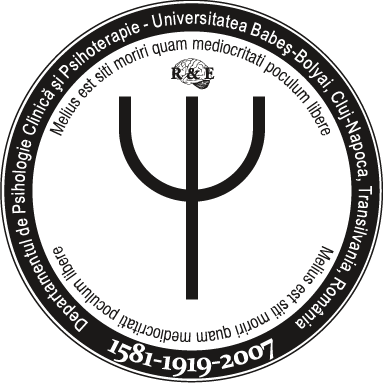În anul 2002/2003 profesorul Daniel David a fost desemnat de un Consorţiu format din oameni de știință de top de la Institute de cercetare şi Universităţi americane de prestigiu (ex. Albert Ellis Institute, Albert Einstein College of Medicine, Mount Sinai School of Medicine, etc.) să formeze şi să conducă o echipă de cercetare internaţională al cărei rol major a fost „…să elaboreze şi să implementeze un Program de Cercetare Programatică – „CBT in the Context of Cognitive Science”, pe o perioadă de 5 ani, – care să integreze domeniul clinic, reprezentat de psihoterapiile cognitive şi comportamentale (CBT), cu cel al ştiinţele cognitive, în aşa numitul domeniu al – „Clinical Cognitive Sciences” -…(aşa cum se prezentau ele la acea dată)”. Cercetarea Programatică este descrisă succint în:
- David, D. (2003). Rational Emotive Behavior Therapy (REBT); The view of a cognitive psychologist. In W. Dryden (Ed.), Theoretical developments in REBT. Brunner/Routledge: London.
Anul acesta (2008) s-a încheiat formal Programul – „CBT in the Context of Cognitive Science” – , printr-un Raport prezentat (Iulie, 2008, la New-York) de profesorul David instituţiilor din SUA care au susţinut financiar demersul. Prezentăm în continuare succint, ideile principale ale Raportului:
1. Rezultatele obţinute s-au exprimat în contribuţii semnificative la cunoaşterea internaţională. Astfel, au fost introduse şi testate în domeniul ştiinţelor cognitive clinice noi constructe şi/sau tehnici psihoterapeutice inovative, cu valenţe euristice remarcabile, precum: „binary model of distress”, „mental contamination in cognitive restructuring”, „response hope”, „the expanded ABC cognitive model of psychopathology”, „rational anticipation technique„, „global restructuring technique„, „incompatible information technique„, etc.. De asemenea au fost testate concurenţial în experimente cruciale (vezi Karl Popper pentru detalii privind acest concept), şi în consecinţă au fost validate sau invalidate, o serie de teorii și modele, clarificându-se astfel tematici care au generat „debate-uri” ani în şir în literatura de specialitate (ex. „qualitative versus quantitative distinction between functional and dysfunctional negative feelings”; „the primacy of demandignes”; „hot versus cold cognition distinction”; „the role of unconscious information processing (cognitive unconscious) in the cognitive model of psychopathology” etc.). Aceste constructe şi rezultate au pătruns deja în limbajul de specialitate, fiind citate în lucrările altor grupuri de cercetare independente (ex. din China, Europa, SUA, etc.).
2. Principalele publicaţii care exprimă activitatea acestui Program – „CBT in the Context of Cognitive Science” – sunt descrise în continuare (alte contribuţii pe baza datelor obținute în acest Program sunt în curs de publicare/elaborare, urmând să apară în următorii 1-2 ani):
- David, D., Szentagotai, A., Lupu, V., & Cosman, D. (2008). Rational emotive behavior therapy, Cognitive therapy, and Medication in the treatment of major depressive disorder: A randomized clinical trial, posttreatment outcomes, and six month follow-up. Journal of Clinical Psychology, 64, 728-746.
- DiLorenzo, T.A., David, D., & Montgomery, G.H. (2007). The interrelations between irrational cognitive processes and distress in stressful academic settings. Personality and Individual Differences, 42, 765-776.
-
Szentagotai, A., & Freeman, A. (2007). An analysis of the relationship between irrational beliefs and automatic thought in predicting distress. Journal of Cognitive and Behavioral Psychotherapies, 7, 1-9.
- Montgomery, G.H, David, D., DiLorenzo, T.A., & Schnur, J.B. (2007). Response expectancies and irrational beliefs predict exam-related distress. Journal of Rational-Emotive and Cognitive-Behavior Therapy, 25, 17-34.
- David, D., Montgomery, G., & DiLorenzo, T.A. (2006). Response expectancy versus response hope in predicting distress. A brief research report. Erdelyi Pszichologiai Szemle, 1, 1-13.
- David, D., & Szentagotai, A. (2006). Cognition in cognitive-behavioral psychotherapies; Toward an integrative model. Clinical Psychology Review, 26, 284-298.
- David, D., David, A., Ghinea, C., Macavei, B., & Kallay, E. (2006). A Search for the „Hot” cognitions in a clinical and a non-clinical context: Appraisal, attributions, core relation theme, irrational beliefs, and their relation to emotion. Advances in Psychology Research, 40, 1-37.
- Szentagotai, A., & Kallay, E. (2006). The faster you move the longer you live – A test of rational emotive behavior therapy? Journal of Cognitive and Behavioral Psychotherapies, 6, 69-80.
- David, D., Montgomery, G.H., Macavei, B., & Bovbjerg, D. (2005). An empirical investigation of Albert Ellis’ binary model of distress. Journal of Clinical Psychology, 61, 499-516.
- David, D., Schnur, J., & Birk, J. (2004). Functional and dysfunctional emotions in Ellis’ cognitive theory; An empirical analysis. Cognition and Emotion, 18, 869-880.
- David, D., Szentagotai, A., Kallay, E., & Macavei, B. (2005). A synopsis of rational-emotive behaviour therapy; Fundamental and applied research. Journal of Rational-Emotive and Cognitive-Behavior Therapy, 23, 175-221.
- David, D., McMahon, J., & Macavei, B. (2005). Cognitive restructuring and mental contamination: An empirical re-conceptualization. Journal of Rational-Emotive and Cognitive-Behavior Therapy, 23, 21-56.
- David, D., Schnur, J., & Belloiu, A. (2002). Another search for the ”hot” cognition: Appraisal irrational beliefs, attribution, and their relation to emotion. Journal of Rational-Emotive and Cognitive-Behavior Therapy, 20, 93-131.
- David, D. (2003). Rational Emotive Behavior Therapy (REBT); The view of a cognitive psychologist. In W. Dryden (Ed.), Theoretical developments in REBT. Brunner/Routledge: London.
3. De asemenea, în urma Programului a rămas o echipă de cercetare performantă, care funcţionează într-o reţea internaţională, cu ”noduri/unități” (puncte de lucru) în Europa, SUA şi România, un actor major și influent în cunoaşterea ştiinţifică internaţională în domeniu.
